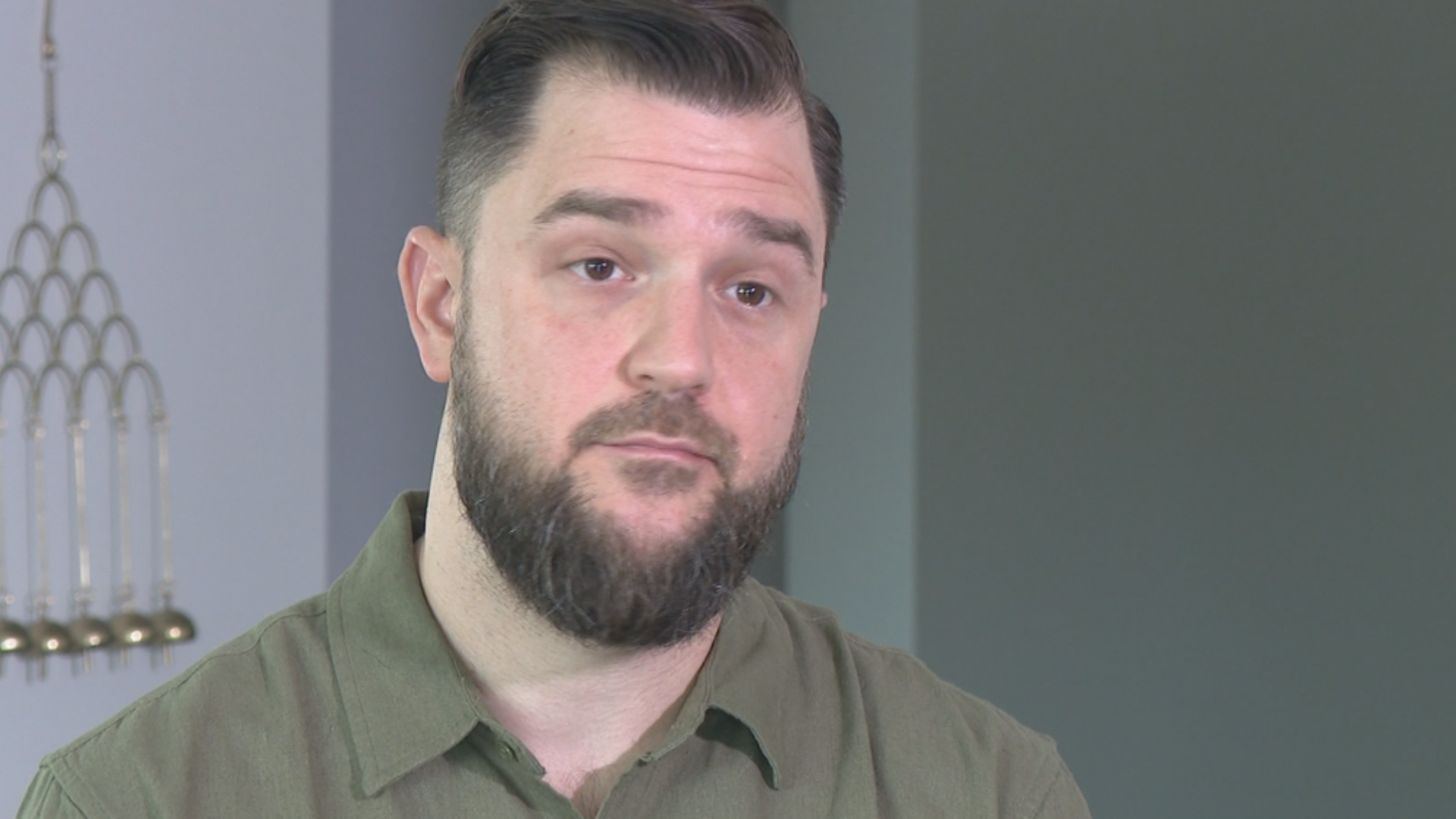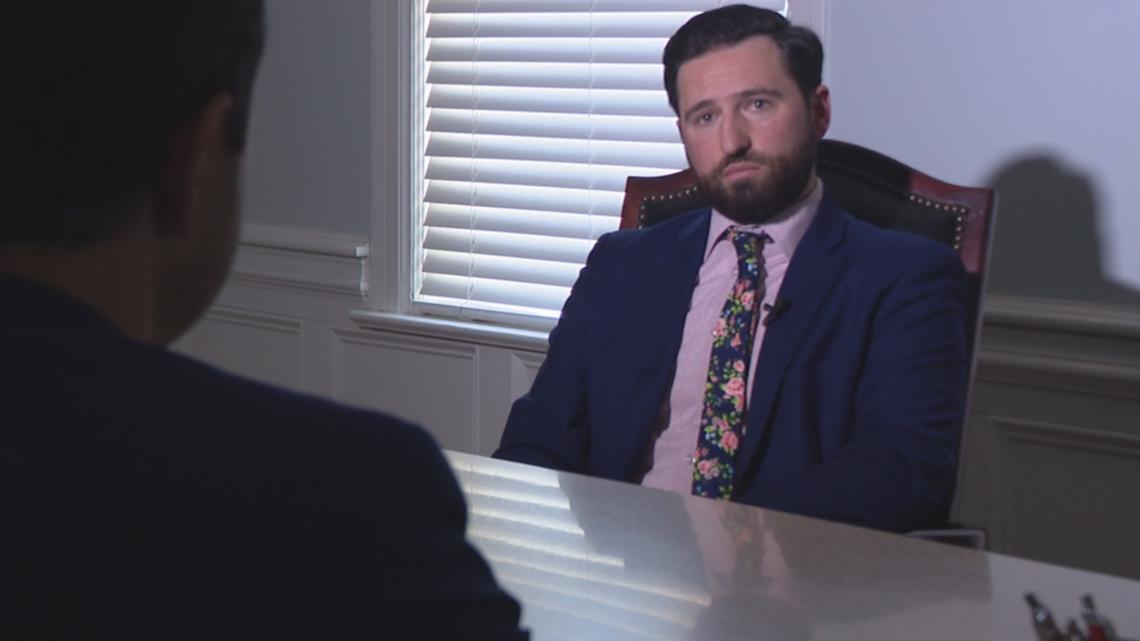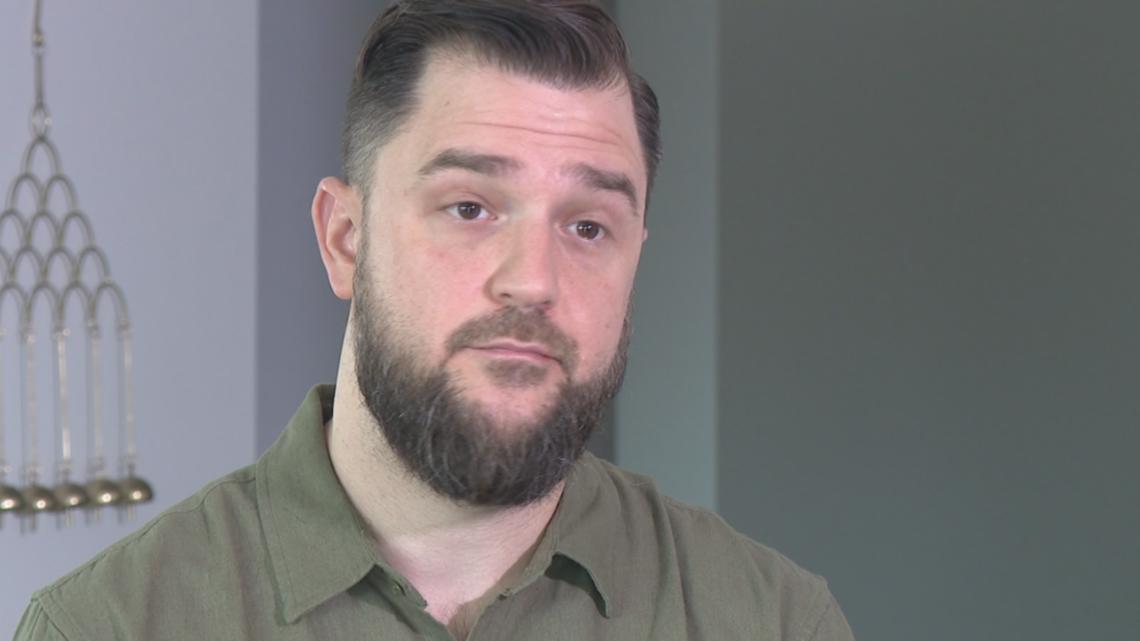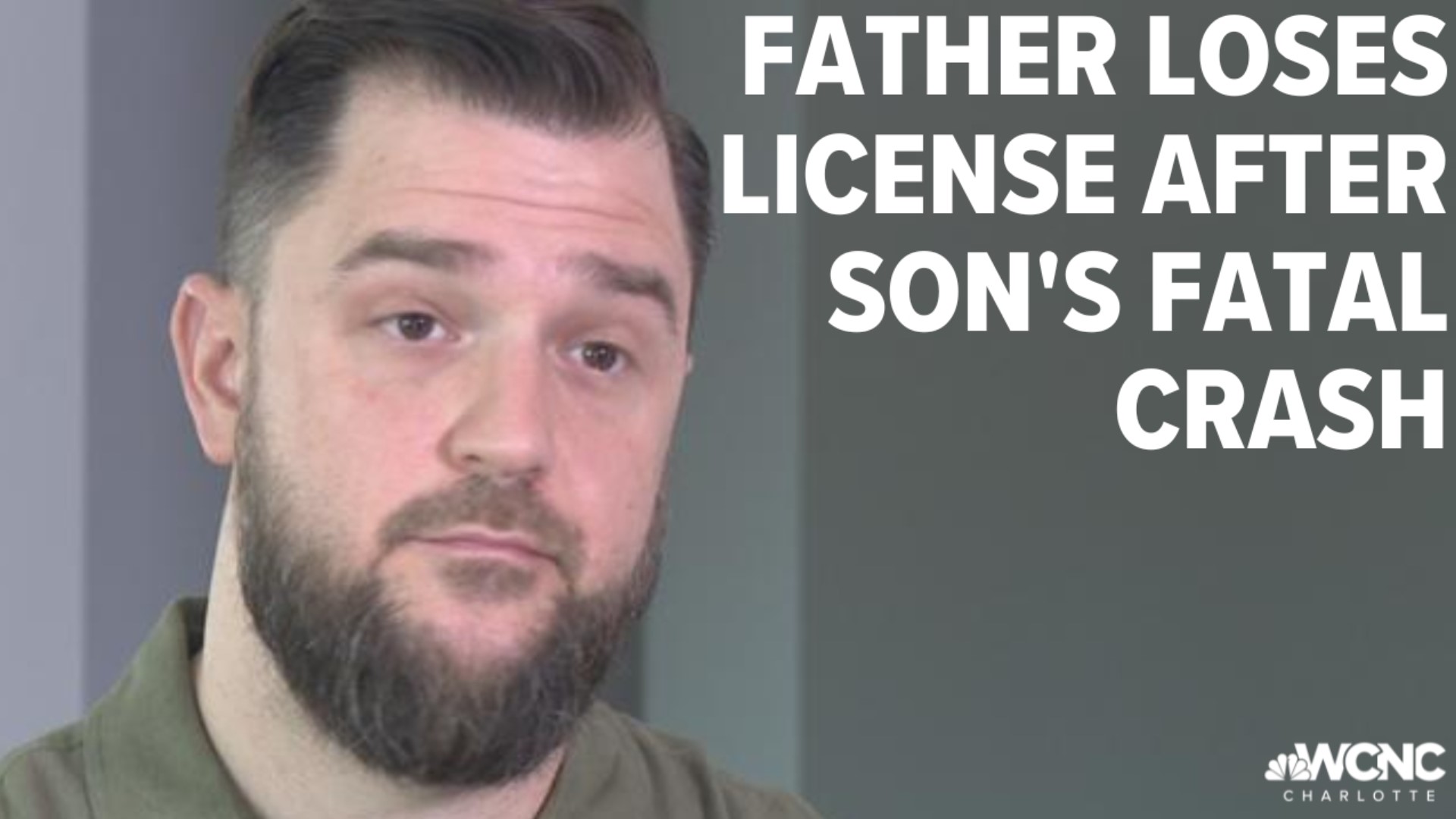'It's one of the most severe and harsh laws': DMV & insurance companies partner to suspend licenses, recoup money
Jacob Twisdale lost everything when his son Evan died in a wreck. Nearly two years later, Jacob's license was suspended and to get it back he'd have to pay $20,000.

Jacob Twisdale paid the price twice.
First, he lost his only child. Then, two years later, the North Carolina Department of Motor Vehicles suspended his driver's license, even though he wasn't involved in the crash that claimed his son's life. To get his license back, he had to pay $20,000.
"I had lost enough," Twisdale said from his Mooresville home. "I lost everything."
While Twisdale's case is extreme, records show the DMV suspends thousands of licenses every year for the same underlying reason.
A lapse in responsibility followed by a deadly crash Evan Beaudet died on his way home from picking up a friend from work. His father described what happened next as an accident.
Evan Beaudet died in Oxford, North Carolina, on Nov. 3, 2020. The 19-year-old was on his way home from picking up a friend from work and dropping him off at his house early that morning. His dad described what happened next as an accident.
"I guess he was tired, fell asleep on the way home and veered off in the other lane and had a head-on collision with another vehicle," Twisdale said. "The last thing he did in his life was a good deed for a friend. That's just who he was."


Twisdale eventually learned, about a month before the crash, Beaudet let his insurance lapse. Normally, that wouldn't impact his father, but Twisdale gave his son the car in question. The teen never officially transferred the title.
"I gave him that car. Signed the title over. He just hadn't taken it to the DMV," Twisdale said. "He was an adult. He had just moved out of the house a couple of months prior. He was on his own. He had flown the coop. It had nothing to do with me and here I am being held financially responsible for it."
The other driver survived and carried uninsured motorist coverage, but that didn't prevent that man's insurance carrier from recouping the cost of the crash.
"I didn't know this was a possibility," Twisdale said.
He now wants others to know just how much power insurance companies hold.
Knowing the law A law passed in 1953 gives insurance companies the ability to request a license suspension if an uninsured driver refuses to pay for damages caused by their car.
In North Carolina, the Motor Vehicle Safety and Financial Responsibility Act of 1953 gives insurance companies the ability to request a license suspension if an uninsured car's owner refuses to pay for damages caused by that car.
"The statutes simply state that if a motor vehicle is involved in an accident without liability insurance, the operator and or owners are required to put a security deposit down with the Division of Motor Vehicles to prevent the loss of one's driving privilege for one year, work out an arrangement to pay back damages for property damages and or bodily injury, or just be suspended for one year," NCDMV Communications Officer John Brockwell said. "This is called Failure to Deposit Security."
DMV records show North Carolina has suspended an average of 7,100 licenses every year for "Failure to Deposit Security."
"The financial impact could be massive" Attorney Ed Martin says he's seen insurance companies demand as little as $500 or as much as hundreds of thousands.
"I would say it's one of the most severe and harsh laws that we have because people don't understand it, they don't know how it works and the financial impact could be massive," Charlotte attorney Ed Martin told WCNC Charlotte. "You can be left on the hook because it is your vehicle. You are responsible for the insurance to that vehicle."
Martin said he's seen insurance agencies demand as little as $500 and as much as hundreds of thousands of dollars, depending on the severity of a crash.
"They can be some nasty, cutthroat people to try to push to get these large settlements done," Martin said.


He calls the law "counterintuitive" since it limits a person's ability to drive to work while charging significant costs.
"Being able to drive a car is probably paramount to anything else," Martin said. "With the insurance company taking that ability away from you, you're making it harder for people to come up with the finances. There should be some other way."
South Carolina has a similar law on the books, with limited exceptions. There, not only is the owner required to cover damages caused by a crash, drivers have to pay a $600 "uninsured motorist fee."
Data provided by the South Carolina Department of Motor Vehicles show the agency has suspended more than 3,400 licenses every year from 2018 through 2022 for failure to deposit security.
WCNC Charlotte is always asking "where's the money?" If you need help, reach out to WCNC Charlotte by emailing money@wcnc.com.
The insurance company responds Twisdale asked for grace due to his extreme circumstances. Here's what happened.
In Twisdale's case, NCDMV didn't suspend his license until almost two years after his son's crash. He said it followed just one attempt by the insurance agency, around the one-year anniversary of Evan's death, to collect money.
Twisdale said at that time, he asked North Carolina Farm Bureau for grace in light of his extreme circumstance but never heard back.
"Nobody had tried to get in touch with me about any decision that had been made," Twisdale said. "The agent that I spoke to retired. I didn't have (the money). I had to reset my entire life after my son died in the accident."


Twisdale said he only recently realized the state suspended his license. Reluctantly, with the help of his father, he paid the $20,000 at the end of January.
"Their legal team is a lot bigger than mine," Twisdale said of North Carolina Farm Bureau. "They have a big legal department. I have a legal team of zero."
The insurance company's general counsel shared a statement with WCNC Charlotte.
"The tragic facts associated with this situation are truly heartbreaking. There is no doubt the underlying accident has severely impacted everyone involved, including Mr. Twisdale and our insured, who sustained property damage and physical injuries and may have experienced emotional distress knowing that a person died in the wreck," North Carolina Farm Bureau Secretary & General Counsel Jake Parker said in an email. "North Carolina law requires that all motor vehicles that are registered in the State be insured. Consistent with this mandate, insurance companies may ask that DMV suspend a person's driving privileges when the person is the owner of an uninsured vehicle and they refuse an insurance company's request for repayment of amounts paid to resolve an uninsured motorist claim. Unfortunately, these scenarios arise frequently, and that's what happened here."
Parker noted Twisdale offered to repay a large portion of the amount he owed, so the company accepted his offer.
"As a result, we have asked that DMV reinstate Mr. Twisdale's driving privileges and we now consider the matter closed," Parker said.
How to protect yourself Beyond carrying an insurance policy, attorney Ed Martin says there are other steps you can take.
Martin said there are ways you can protect yourself.
"It's almost to the point, if there is any chance you can get behind the wheel of a car, you should have a valid policy," Martin said. "If your grandmother asks you to move the car out front, you need to have an insurance policy."
Beyond carrying an insurance policy, the attorney said there are other steps you can take.
"When it comes to transferring title, for family members you gotta be on the up and up," he said. "Make a DMV appointment before turning over the keys. Getting the car out of your name when it comes to the registration is another method. When selling a car, I would say getting it to a dealer is always the best practice. However, if they are going to sell the car, again get that registration cleared. Force that information to be transferred over on-site. Just like it does when you buy a car. What I would say to best protect yourself — a paper trail.
"Bills of sale, documents from the DMV, billing statements and correspondence from your insurance carriers. Anything to show the DMV you did what you were supposed to do, and more."
The American Property Casualty Insurance Association also recommends taking control when transferring a title.
“If you are selling a vehicle or gifting a vehicle, it is important to verify the registration and title are transferred to the new owner so that you are protected from potential liability should an accident occur,” Robert Passmore, the vice president of APCIA's personal lines department, said. “One way to do this is to go together in person to the DMV to process the necessary paperwork. If going together in person is not an option, you could potentially call the DMV and ask them to verify what cars are titled in your name.”


'Seems pretty tragic' Martin said the demand from the DMV is "a little ridiculous" given Twisdale's extreme situation.
Martin said he feels terrible for Twisdale.
"He lost his kid and they still want their money," Martin said. "Seems pretty tragic. "For them to demand that money is frankly a little ridiculous."
Twisdale is now trying to raise money to repay his father. His son, meanwhile, lives on in his memory.
"He was a safe space for a lot of people and he was selfless," he said. "In my mind, he passed away in his sleep. That's how I found peace with it."

